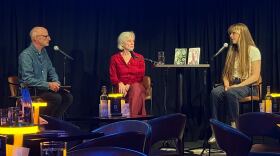Whether it's the overuse of like, saying "nuculear", or using the word "literally", figuratively, misuse of language has a way of getting under our skin. A linguist assures us that language is always changing...so loosen up. Today, why dictionaries and grammar sticklers can't stop improper language.
Plus artists, researchers and cartographers re-interpret the city that never sleeps... Illustrating its distinctive culture, history and variety through maps.
Listen to the full show.
Nonstop Metropolis
Maybe you’ve heard the old joke: New York, the world’s 14th biggest city, world’s biggest ego. The city and its residents have an oversized place in our imagination – Wall Street and its high rollers, Broadway, midtown media empires. In movies and in television shows and street shots on Instagram, and we’ve seen them: fast walking, fast talking New Yorkers. But, anyone who has visited or lives there knows that there are many, many New Yorks.
Joshua Jelly-Shapiro is a geographer, writer, and co-author with Rebecca Solnit of Nonstop Metropolis: A New York City Atlas.
One Man is an Island
Now, a story of a reporter searching for a way to interview rapper Busta Rhymes, who wound up discovering a tiny island instead.
You can listen to this story again at PRX.org.
Words on the Move
What happens when you hear someone say "like,” like four times per sentence? How about "I literally just said that!" Does it give you a little shiver of judginess? John McWhorter teaches English and Comparative Lit at Columbia and has written several books on language...his most recent is Words on the Move: Why English Won't - and Can't - Sit Still. He writes that language is ever in flux, and that’s a good thing.
An Afternoon with the Bard in Golden Gate Park
Despite the constant evolution of language, Shakespeare remains a cultural icon – every high schooler in America reads his plays, his themes are repeated time and time again in literature and movies. Producer Jeremy Dalmas from Crosscurrents brings us the story of another Shakespearean refuge in the twenty-first century.
You can listen to this story again at PRX.org.







